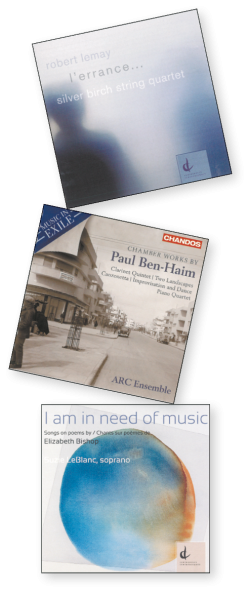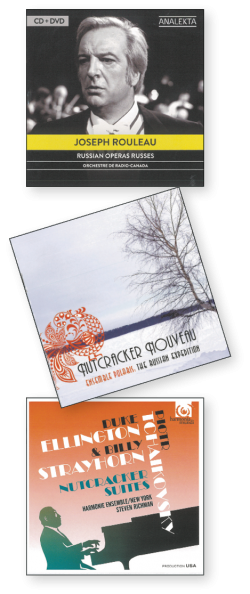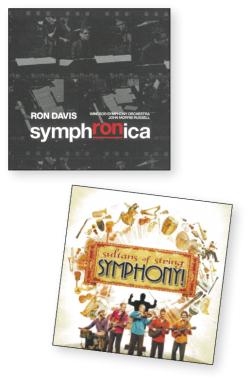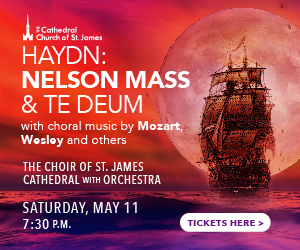 This month brevity will have to be the soul of wit as I try to do justice to some of the many interesting CDs to land on my desk in recent weeks. To begin, a marvellous discovery from northern Ontario. I have long known and enjoyed the music of Sudbury-based Robert Lemay but I had not previously heard his music for string quartet nor for that matter did I know there even was a string quartet in that city. L’errance …, another in the wealth of recent releases on the Centrediscs label (CMCCD 19513) has opened my ears on both accounts. The Silver Birch String Quartet is an excellent ensemble of young players currently in residence at Laurentian University with a string of accomplishments, including a previous recording with Montreal jazz pianist John Roney that garnered a JUNO nomination in 2010 and two Felix Awards, which makes me wonder why they weren’t already on my radar. This disc spans two decades of the Lemay’s output, beginning with L’errance ... hommage à Wim Wenders composed over a two-year period in Montreal, Quebec City and Buffalo, completed in 1990. It takes its inspiration from Wenders’ film Wings of Desire and is the first of a series of works paying tribute to different film directors. Although written long before the group’s formation, Silver Birch have toured this work extensively and feel it to be a signature piece in their repertoire. Opening with an extended cello solo and ending with solo violin, in this it is reminiscent of the third quartet of Canadian icon R. Murray Schafer, although Lemay’s language is quite distinct. The other works are more recent and reflect the mature voice of this composer. Structure/paysage ... hommage à Eli Bornstein (2008) is one of a series of works honouring abstract painters, in this case the leader of the Canadian structuralist abstract school. For the final and most developed work on the CD, Territoires intérieurs (hommage à Bernard Émond) (2010), the quartet is joined by pianist Yoko Hirota. This captivating piece was commissioned by the quartet and developed over the period of a residency at the Banff Centre which they say “was among the most artistically fulfilling projects for us as a quartet.” Certainly that camaraderie is conveyed in this performance which was captured in all its intimate glory in this Glenn Gould Studio recording by engineer Dennis Patterson and producer David Jaeger. This is one of the most satisfying chamber discs to come my way in a long time.
This month brevity will have to be the soul of wit as I try to do justice to some of the many interesting CDs to land on my desk in recent weeks. To begin, a marvellous discovery from northern Ontario. I have long known and enjoyed the music of Sudbury-based Robert Lemay but I had not previously heard his music for string quartet nor for that matter did I know there even was a string quartet in that city. L’errance …, another in the wealth of recent releases on the Centrediscs label (CMCCD 19513) has opened my ears on both accounts. The Silver Birch String Quartet is an excellent ensemble of young players currently in residence at Laurentian University with a string of accomplishments, including a previous recording with Montreal jazz pianist John Roney that garnered a JUNO nomination in 2010 and two Felix Awards, which makes me wonder why they weren’t already on my radar. This disc spans two decades of the Lemay’s output, beginning with L’errance ... hommage à Wim Wenders composed over a two-year period in Montreal, Quebec City and Buffalo, completed in 1990. It takes its inspiration from Wenders’ film Wings of Desire and is the first of a series of works paying tribute to different film directors. Although written long before the group’s formation, Silver Birch have toured this work extensively and feel it to be a signature piece in their repertoire. Opening with an extended cello solo and ending with solo violin, in this it is reminiscent of the third quartet of Canadian icon R. Murray Schafer, although Lemay’s language is quite distinct. The other works are more recent and reflect the mature voice of this composer. Structure/paysage ... hommage à Eli Bornstein (2008) is one of a series of works honouring abstract painters, in this case the leader of the Canadian structuralist abstract school. For the final and most developed work on the CD, Territoires intérieurs (hommage à Bernard Émond) (2010), the quartet is joined by pianist Yoko Hirota. This captivating piece was commissioned by the quartet and developed over the period of a residency at the Banff Centre which they say “was among the most artistically fulfilling projects for us as a quartet.” Certainly that camaraderie is conveyed in this performance which was captured in all its intimate glory in this Glenn Gould Studio recording by engineer Dennis Patterson and producer David Jaeger. This is one of the most satisfying chamber discs to come my way in a long time.
A close second is the latest from the ARC Ensemble (Artists of the Royal Conservatory), a Chandos recording featuring Chamber Works by Paul Ben-Haim (CHAN 10769). Ben-Haim, born Paul Frankenburger in 1897, was a German Jew who immigrated to Palestine shortly after Hitler’s rise to power in 1933. The bulk of this disc is devoted to works written in the decade after arrival in Palestine, including works for viola and piano and violin and piano from 1939 and a piano piece from 1944. It is obvious from the use of Middle Eastern themes and references to the local landscape that Ben-Haim was quick to embrace his new land. The most substantial of these is a clarinet quintet from 1941 about which the composer says “I was very satisfied because I felt that I had at last succeeded in consolidating a new style.” This lush and lyrical work is beautifully performed by Joachim Valdepeñas and a string quartet comprised of Marie Bérard, Erika Raum, Steven Dann (also featured in the haunting viola pieces) and Bryan Epperson. It was revised in 1965 and I wish the liner notes mentioned what sort of revisions the composer made more than two decades after writing the work. The disc opens with an early venture, the Piano Quartet Op.4 from 1920-21 (violinist Benjamin Bowman and pianist David Louie join Dann and Epperson) which shows the influence of Germanic forebears Brahms and Strauss but also French nuances of Fauré and to my ear, Debussy. Evidently the composer suppressed his pre-immigration works and until unearthed in the Ben-Haim archives and performed by the ARC Ensemble in 2012 this quartet had not been heard since a radio broadcast in 1932 before the composer left Germany. As with their three previous releases (on RCA Red Seal) of music by Mieczyslaw Weinberg, Julius Röntgen, Walter Braunfels and Adolf Busch the ARC Ensemble continues to bring to light some repertoire unjustly neglected due to political suppression or shifts in musical fashion, in stunning performances through its Music in Exile series under the artistic direction of Simon Wynberg.
I Am in Need of Music is the title of another new Centrediscs release featuring songs on poems of Nova Scotian Elizabeth Bishop (CMCCD 19413) composed by Alasdair MacLean (NS), John Plant (QC), Emily Doolittle (NB) and Christos Hatzis (ON). Best known for her extensive work in the field of early music, soprano Suzie LeBlanc brings her signature vocal purity to this project which she conceived and developed between 2007 and 2011, Bishop’s centenary year, in conjunction with poet and Bishop scholar Sandra Barry. Together they decided to commission settings of Bishop’s poems in honour of the anniversary and it was Barry who told LeBlanc about a walking trip that Bishop had undertaken in 1932 in rural Newfoundland. LeBlanc, a walker in her own right, decided to recreate this journey as well as could be done some 75 years of development later, and invited filmmaker Linda Dornan to join her. The results were two-fold, both documented in this combined CD and DVD release from the Canadian Music Centre: more than an hour’s worth of music wonderfully performed by LeBlanc accompanied by the Blue Engine String Quartet (MacLean) and the Elizabeth Bishop Players under the direction of Dinuk Wijeratne (Plant, Doolittle and Hatzis); and a half-hour video of LeBlanc and Dornan’s adventure in the outports of Newfoundland. The music, although consistently lyrical and tonally based, is quite eclectic in the different musical languages of these composers. Most surprising to me was to hear yet another side of chameleon-like composer Hatzis whose charming settings show him to be as at home in the idiom of musical theatre as in the diverse and multi-ethnic worlds of his previous compositions. Congratulations to Suzie LeBlanc on the success of her vision and to all concerned in this endeavour.
Concert note: Suzie LeBlanc is featured with tenor Charles Daniels in Tafelmusik’s “Purcell and Carissimi: Music from London and Rome” at Trinity-St. Paul’s Centre November 6 through 10. She also joins Les Voix Humaines Consort of Viols for a Women’s Musical Club of Toronto recital November 21 at Walter Hall.
 In brief: Analekta has released a CD/DVD combination featuring one of the celebrated historical voices of Canadian opera, bass Joseph Rouleau. Now 84, Rouleau is a Companion of the Order of Canada and Grand Officer of the Order of Quebec. I was first introduced to the splendour of his voice in a CBC recording of the extended orchestral song cycle he commissioned from Jacques Hétu in 1984, Les Abîmes du rêve based on the poetry of Émile, and I was hooked. Although particularly associated with French and Italian repertoire, Russian Operas Russes (AN 2 9223-4) makes it clear that Rouleau was also at home in the role of basso profundo as displayed in selected arias from the operas of Borodin, Rimsky-Korsakov, Mussorgsky, Tchaikovsky and Rachmaninov. The recording, dating from the height of his career, originated in 1972 from the concert Soirée de musique russe avec Joseph Rouleau produced for Les Beaux Dimanches at Radio Canada. The bonus DVD features Rouleau in the title role of Boris Godunov’s Death Scene (Act Four, Scene Two of Mussorgsky’s opera) filmed in 1983. This is a welcome testament to one of the great voices of our country and although the sound is not as pristine as might be hoped, it is still sufficient to send chills down the spine.
In brief: Analekta has released a CD/DVD combination featuring one of the celebrated historical voices of Canadian opera, bass Joseph Rouleau. Now 84, Rouleau is a Companion of the Order of Canada and Grand Officer of the Order of Quebec. I was first introduced to the splendour of his voice in a CBC recording of the extended orchestral song cycle he commissioned from Jacques Hétu in 1984, Les Abîmes du rêve based on the poetry of Émile, and I was hooked. Although particularly associated with French and Italian repertoire, Russian Operas Russes (AN 2 9223-4) makes it clear that Rouleau was also at home in the role of basso profundo as displayed in selected arias from the operas of Borodin, Rimsky-Korsakov, Mussorgsky, Tchaikovsky and Rachmaninov. The recording, dating from the height of his career, originated in 1972 from the concert Soirée de musique russe avec Joseph Rouleau produced for Les Beaux Dimanches at Radio Canada. The bonus DVD features Rouleau in the title role of Boris Godunov’s Death Scene (Act Four, Scene Two of Mussorgsky’s opera) filmed in 1983. This is a welcome testament to one of the great voices of our country and although the sound is not as pristine as might be hoped, it is still sufficient to send chills down the spine.
The next disc made me laugh out loud on first hearing. I really didn’t know what to expect from Nutcracker Nouveau – The Russian Expedition from the wacky eclectic local Ensemble Polaris (ensemblepolaris.com). I had been told by core member Alison Melville that this was the closest they would ever come to a Christmas disc, so we’re perhaps rushing the season a bit (as I write this Halloween is still a couple of weeks away) but as they will be launching the disc on November 29 at the Edward Day Gallery at 952 Queen St. W. and as I’m told the disc will be in stores by the time this issue of WholeNote hits the streets (and because as you will see shortly there are other connections afoot) I thought I’d slip it in now. The opening track, Kirk Elliott’s arrangement of Tchaikovsky’s “Trepak” from The Nutcracker, begins with what sounds like Duelling Banjos followed by the theme from The Beverly Hillbillies before settling into the familiar melody from Tchaikovsky’s ballet. This sets the stage for a hilarious homage to the Russian master. The instrumentation ranges from guitars, mandolins and banjos through violin, accordion, bagpipes, bazouki, flutes, recorders and clarinets to a host of multi-cultural percussion instruments. Particularly effective is the guzheng and the violin convincingly impersonating an erhu in Melville and Elliott’s arrangement/medley of the traditional Chinese melody Picking Tea and Tchaikovsky’s “Danse Chinoise” which also features descant recorder and musical saw among other oddities. The suite is a clever and entertaining blend of new takes on the familiar ballet themes intertwined with other Slavic favourites. Perhaps due to my personal preference for the instrument I must mention the gorgeous sound of Margaret Gay’s cello which was captured in all its glory by Jeremy Darby at Canterbury Sound.
The Polaris ensemble is of course not the first to make original arrangements of this most “Christmas” of all ballets. Another instance arrived recently from Harmonia Mundi featuring Tchaikovsky’s original Nutcracker Suite, Op.71a in a straight ahead and wonderfully lush performance by the Harmonie Ensemble New York under Steven Richman paired with a 1960 arrangement by Duke Ellington and Billy Strayhorn (HMU 907493). For this iconic jazz rendition the Harmonie is joined by Lew Tabackin tenor sax, Lew Soloff trumpet, Bill Easley clarinet, Victor Lewis drums and George Cables piano. If you are not already familiar with this wonderful example of “third stream” music you owe it to yourself to check it out. Rarely has there been such a successful fusion of traditional classical music and big band jazz.
 Classical/jazz fusion continues to inspire artists and a recent local example is (primarily) jazz pianist Ron Davis who makes a strong case for it in the liner notes to his new CD SymphRonica with the Windsor Symphony Orchestra and John Morris Russell (rondavismusic.com). The disc includes six Davis compositions arranged by Timothy Berens and Jason Nett along with two traditional tunes and a variation on J.S. Bach’s Mache Dich Mein Herze Rein. Davis is joined by bassist Mike Downes and drummer Ted Warren for the jazz treatments with orchestral soloists Sasha Boychouk clarinet and Lillian Scheirich violin. While SymphRonica is certainly not in the same league as the Ellington/Strayhorn Nutcracker arrangements it is obvious that it is a labour of love and that a good time was had by all, classical and jazz participants alike.
Classical/jazz fusion continues to inspire artists and a recent local example is (primarily) jazz pianist Ron Davis who makes a strong case for it in the liner notes to his new CD SymphRonica with the Windsor Symphony Orchestra and John Morris Russell (rondavismusic.com). The disc includes six Davis compositions arranged by Timothy Berens and Jason Nett along with two traditional tunes and a variation on J.S. Bach’s Mache Dich Mein Herze Rein. Davis is joined by bassist Mike Downes and drummer Ted Warren for the jazz treatments with orchestral soloists Sasha Boychouk clarinet and Lillian Scheirich violin. While SymphRonica is certainly not in the same league as the Ellington/Strayhorn Nutcracker arrangements it is obvious that it is a labour of love and that a good time was had by all, classical and jazz participants alike.
Concert note: Ron Davis launches SymphRonica with events at the Lula Lounge on November 3 and 10.
Another disc that expands the scope of the classical orchestra is Symphony!, the latest offering from Toronto’s many-influenced Sultans of String (sultansofstring.com).Violinist Chris McKhool and his colleagues, guitarists Kevin Laliberte and Eddie Paton, bass player Drew Birston and percussionist Rosendo “Chendy” Leòn, are joined by some very special guests including Bassam Bishara on oud, James Hill ukulele, Larry Larson trumpet and Paddy Maloney of The Chieftains on pennywhistle and pipes. Add to this 55 of Toronto’s top orchestral players under the direction of Jamie Hopkings and some very effective orchestrations by Rebecca Pellett and we are presented with a wonderfully playful disc of mostly original material penned by McKhool and Laliberte ranging from gypsy style and flamenco to Middle Eastern influences. Of course there is a good measure of swing in the mix, along with some lush soundtrack-like pieces and the pop song proposal Will You Marry Me with backing vocals by Dala.
Concert note: You can catch a live version of this “roots-worldbeat-symphony mash-up” at Koerner Hall on December 1 when the Sultans of String will be joined by the Cathedral Bluffs Symphony Orchestra.
We welcome your feedback and invite submissions. CDs and comments should be sent to: The WholeNote, Centre for Social Innovation, 503–720 Bathurst St., Toronto ON, M5S 2R4. We also encourage you to visit our website thewholenote.com where you can find added features including direct links to performers, composers, record labels and additional, expanded and archival reviews.
—David Olds, DISCoveries Editor
discoveries@thewholenote.com



